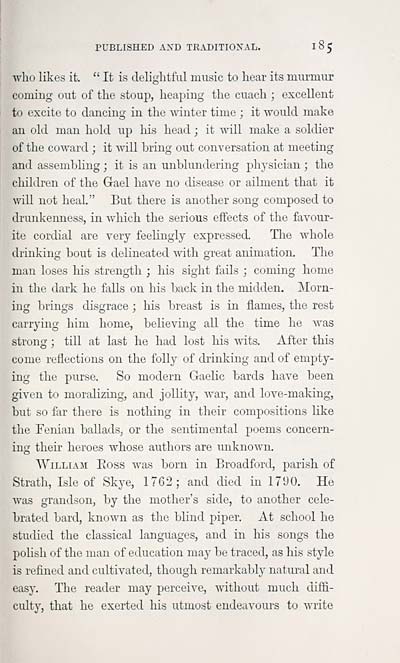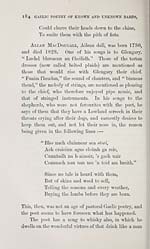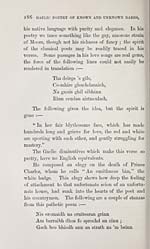Download files
Complete book:
Individual page:
Thumbnail gallery: Grid view | List view

PUBLISHED AXD TRADITIONAL. I 8 5
wlio likes it. " It is delightful miisic to hear its miu-mur
coming out of the stoup, heaping the cuach ; excellent
to excite to dancing in the Avinter time ; it would make
an old man hold up his head ; it will make a soldier
of the coward ; it will bring out conversation at meeting
and assembling ; it is an unblundering ph3^sician ; the
children of the Gael have no disease or ailment that it
will not heal." But there is another song composed to
drunkemiess, in which the serious effects of the favour-
ite cordial are very feelingly expressed. The whole
drinking bout is delineated with great animation. The
man loses his strength ; his sight fails ; coming home
in the dark he falls on his back in the midden. Morn-
ing brings disgrace ; his breast is in fl.ames, the rest
carrying him home, believing all the time he was
strong ; till at last he had lost his wits. After this
come reflections on the folly of drinking and of empty-
ing the purse. So modern Gaelic bards have been
given to moralizing, and jollity, war, and love-making,
but so far there is nothing in their compositions like
the Fenian ballads, or the sentimental poems concern-
ing their heroes whose authors are unknown.
William Eoss was born in Broadford, parish of
Strath, Isle of Skye, 1762; and died in 1790. He
was grandson, by the mother's side, to another cele-
brated bard, known as the blind piper. At school he
studied the classical languages, and in his songs the
polish of the man of education may be traced, as his style
is refined and cultivated, though remarkably natural and
easy. The reader may perceive, without much difiS.-
ciilty, that he exerted his utmost endeavours to write
wlio likes it. " It is delightful miisic to hear its miu-mur
coming out of the stoup, heaping the cuach ; excellent
to excite to dancing in the Avinter time ; it would make
an old man hold up his head ; it will make a soldier
of the coward ; it will bring out conversation at meeting
and assembling ; it is an unblundering ph3^sician ; the
children of the Gael have no disease or ailment that it
will not heal." But there is another song composed to
drunkemiess, in which the serious effects of the favour-
ite cordial are very feelingly expressed. The whole
drinking bout is delineated with great animation. The
man loses his strength ; his sight fails ; coming home
in the dark he falls on his back in the midden. Morn-
ing brings disgrace ; his breast is in fl.ames, the rest
carrying him home, believing all the time he was
strong ; till at last he had lost his wits. After this
come reflections on the folly of drinking and of empty-
ing the purse. So modern Gaelic bards have been
given to moralizing, and jollity, war, and love-making,
but so far there is nothing in their compositions like
the Fenian ballads, or the sentimental poems concern-
ing their heroes whose authors are unknown.
William Eoss was born in Broadford, parish of
Strath, Isle of Skye, 1762; and died in 1790. He
was grandson, by the mother's side, to another cele-
brated bard, known as the blind piper. At school he
studied the classical languages, and in his songs the
polish of the man of education may be traced, as his style
is refined and cultivated, though remarkably natural and
easy. The reader may perceive, without much difiS.-
ciilty, that he exerted his utmost endeavours to write
Set display mode to: Large image | Transcription
Images and transcriptions on this page, including medium image downloads, may be used under the Creative Commons Attribution 4.0 International Licence unless otherwise stated. ![]()
| Early Gaelic Book Collections > Blair Collection > Popular tales of the West Highlands > Volume 4 > (201) |
|---|
| Permanent URL | https://digital.nls.uk/76368285 |
|---|
| Shelfmark | Blair.176 |
|---|---|
| Attribution and copyright: |
|
| Description | Orally collected, with a translation by J.F. Campbell. |
|---|---|
| Shelfmark | Blair.173-176 |
| Additional NLS resources: | |
| Description | A selection of books from a collection of more than 500 titles, mostly on religious and literary topics. Also includes some material dealing with other Celtic languages and societies. Collection created towards the end of the 19th century by Lady Evelyn Stewart Murray. |
|---|
| Description | Selected items from five 'Special and Named Printed Collections'. Includes books in Gaelic and other Celtic languages, works about the Gaels, their languages, literature, culture and history. |
|---|

